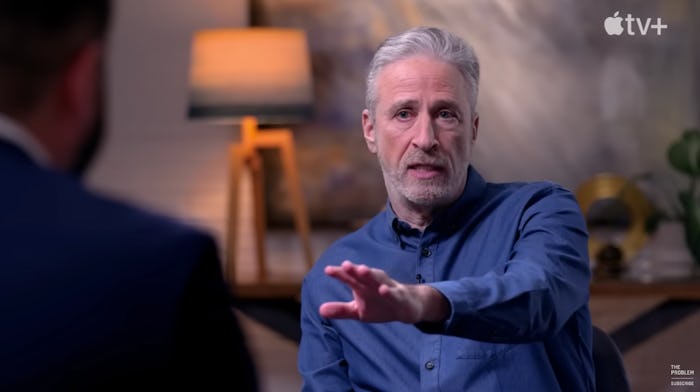Politics
Jon Stewart Calls Out Pro-Gun Lawmaker For Doing The Opposite Of Protecting Children
“What’s the leading cause of death amongst children in this country? And I’m going to give you a hint. It’s not drag show readings to children.”
The headline “Jon Stewart Schools Lawmaker” could have been written 25 years ago, but the comedian/political commentator has gone viral once again for his latest episode of The Problem with Jon Stewart, “Chaos, Law, and Order,” for his interview with guns rights activist and Oklahoma Sen. Nathan Dahm (R). As of press time, a nine-minute clip from the interview has been viewed over a million times on the show’s YouTube channel and has gone viral on Twitter. In it, the two men calmly and respectfully, but bluntly and unrelentingly, discuss gun regulation in the form of background checks, red flag laws, and registration, all of which Dahm rejects outright. Stewart insistently pushes back on Dahm’s arguments, beginning with Dahm’s claim that more guns with fewer restrictions will make Americans safe.
“You’re saying more guns makes us more safe?” Stewart asked, to which Dahm replied in the affirmative. “So... when? We’ve got 400 million guns in the country, we had an increase and gun deaths went up. So when exactly does this curve hit that takes it down? Would a billion guns do it?”
After a continued back and forth, Dahm asserted that he believed the issue of gun violence lies not with the guns but with individuals, stating: “I’m saying that because people are the problem, we’ve got to look at the problems those people are facing, and how do we address it?” (One root issue Dahm cited, without evidence, is that 80% of school shooters come from “broken or fatherless homes.”)
“But you’ve removed the ability of the state to do that,” Stewart countered. “If you don’t have background checks and you don’t have registration and permitting, how do you know who has a problem in terms of the people who you’re giving a gun to? ... What you’re doing is, you’re bringing chaos to order.”
Dahm often touts himself as “Oklahoma’s most conservative State Senator.” Frankly, this is not an unfair claim. After getting involved in “Tea Party Republicanism” in the 2010s, he has served as an Oklahoma State Senator since 2012 and has routinely promoted bills that would loosen restrictions on gun ownership and weaken enforcement of existing laws. But his conservative street cred goes beyond his A+ rating from the National Rifle Association. He has also consistently voted against abortion rights, environmental protections, LGBTQ+ rights (more on that in a bit), and introduced a resolution in the state senate calling for the creation of a “Donald J. Trump Day” as well as a bill that would classify anyone arrested in conjunction with the insurrection of Jan. 6 as a “political prisoner” and prohibit federal authorities from transporting them from or through Oklahoma.
Dahm has also taken a firm stance on one of the conservative bogeyman du jour — Drag Queen story hours — which he tells Stewart he would like to make illegal “because the government does have a responsibility, in certain instances, to protect children.”
“Uh-huh,” Stewart says, overlapping the senator’s point. “What’s the leading cause of death among children in this country? And I’m going to give you a hint. It’s not drag show readings to children. So what is it?”
“I’m presuming you’re going to say it’s firearms,” Dahm demures.
“No, I’m not going to say it like it’s an opinion, that’s what it is,” Stewart says. “It’s firearms, more than cancer, more than car accidents. And what you’re telling me is, you don’t mind infringing free speech to protect children from this amorphous thing that you think of, but when it comes to children that have died you don’t give a flying f*ck to stop that because that shall not be infringed. That is hypocrisy at its highest order.”
As of 2020, the latest year for which we have data from the Centers of Disease Control and Prevention (CDC), firearms is, indeed, the leading cause of death among children in the United States. These statistics include homicide, accidental death, and death by suicide. Children of color are disproportionately affected, though no racial or socioeconomic group remains untouched by these grim statistics.
Some on social media have questioned whether engaging extreme politicians in public debate, as Stewart does is a wise decision, even when you’re acknowledged as “owning,” “schooling,” or “destroying” your opponent. Author Monica Byrne tweeted, “Dissecting-hypocritical-arguments-for-entertainment thing ... didn’t work [earlier in Stewart’s career]. It won’t work now.”
“It is hard to overstate the negative impact Jon Stewart and his brand of infotainment had on our politics and culture,” laments Twitter user @hampprescott. “A whole generation was taught to prioritize snark over persuasion, superficial and clever sloganeering over substantive understanding of complex issues.”
Still, Stewart has been widely praised for his conduct on social media. Writer and lawyer Amee Vanderpool touted Stewart’s “sublime common sense and unyielding pressure.” Professor Christian Christensen of the University of Stockholm agrees and describes the interview as “precisely how US journalists should meet politicians like this ... a master-class in refusing to accept their bullsh*t.”
